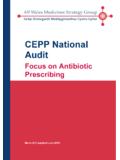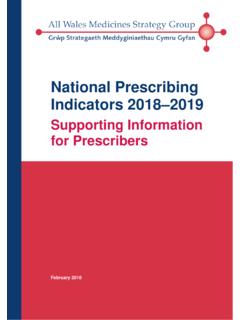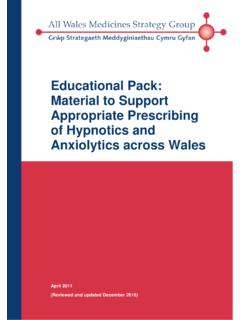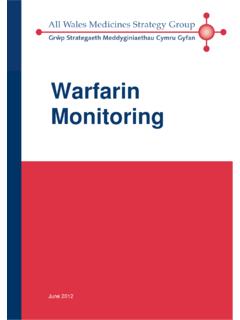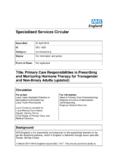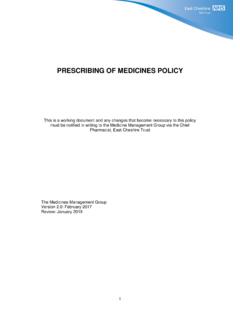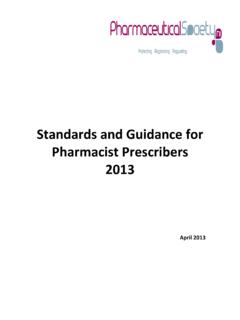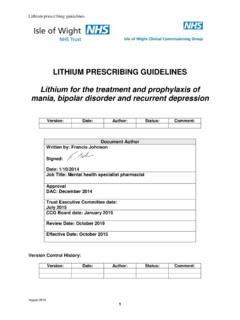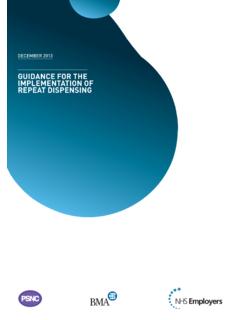Transcription of Polypharmacy: Guidance for Prescribing - AWMSG
1 polypharmacy : Guidance for Prescribing Figure 1: Key Considerations for Prescribing in Frail Adults July 2014. This Guidance has been prepared by Emyr Jones, Macmillan Palliative Care Pharmacist, Aneurin Bevan University Health Board and Jenny Pugh-Jones, Head of Medicines Management, Hywel Dda University Health Board, with support from the All Wales Prescribing Advisory Group (AWPAG) and the All Wales Therapeutics and Toxicology Centre (AWTTC), and has subsequently been endorsed by the All Wales Medicines Strategy Group ( AWMSG ). Please direct any queries to AWTTC: All Wales Therapeutics and Toxicology Centre University Hospital Llandough Penlan Road Llandough Vale of Glamorgan CF64 2XX. 029 2071 6900.
2 This document should be cited as: All Wales Medicines Strategy Group. polypharmacy : Guidance for Prescribing . July 2014. polypharmacy Figure 1. Key Considerations for Prescribing in Frail Adults CONTENTS. Figure 1. Key Considerations for Prescribing in Frail Adults .. 2. Why is reviewing polypharmacy important? .. 2. Medicines 4. Start with the basics Can the patient manage their medicines? .. 5. Medication review process .. 6. High-risk medication11 .. 7. Other factors to consider when conducting a review14,15 .. 8. polypharmacy in the frail elderly .. 9. Specific considerations for patients with dementia .. 10. Patients with renal dysfunction .. 11. Anticholinergic effects .. 11. Indications of shortened life expectancy.
3 12. REFERENCES .. 13. Acknowledgements This Guidance has been adapted from documents developed by Abertawe Bro Morgannwg and Hywel Dda University Health Boards, originally adapted from NHS. Highland with their kind permission, and from resources produced by Emyr Jones of Aneurin Bevan University Health Board, to provide clinicians with a structured process of rationalising patients' medication, in particular the frail and elderly. Page 1 of 14. All Wales Medicines Strategy Group Figure 1. Key Considerations for Prescribing in Frail Adults Why is reviewing polypharmacy important? Medication is by far the most common form of medical intervention. Four out of five people aged over 75 years take a prescription medicine and 36% are taking four or more1.
4 However, it is suggested that up to 50% of medicines are not taken as prescribed2. Many medicines in common use can cause problems, and adverse reactions to medicines are implicated in hospital admissions3. Patients on multiple medications are at increased risk of suffering side effects. This is more likely to be related to the co-morbidities a patient has, rather than to their age4. Patients are often prescribed (and may remain on) medication that causes ADRs and prescribers should consider if the harm of each medicine outweighs the benefits5. These guidelines aim to provide Guidance on how to make a safe and sensible decision in situations where extra thought and consideration are needed. Patient groups include: The NO TEARS tool6.
5 1. Patients who are taking a large number of medications ( polypharmacy ) this may include over Need and indication the counter remedies. Open questions Medication review process A review should be conducted holistically by considering each Tests and monitoring medication and its impact on the individual clinical circumstances of the patient. As part of this Evidence and guidelines it is important to consider the additive effects of each medication. It is essential to ensure that Adverse events the patient is capable of taking the medicine and that compliance is satisfactory. The NO Risk reduction or prevention TEARS tool can be used to simplify and aid the review process. Simplification and switches High-risk medication Medications that are most likely to cause significant harm to the patient should be prioritised and reviewed.
6 2. Patients with indications of shortened life expectancy (where life expectancy is shorter than the time that medication would take to give significant effect). It is important to identify these patients and to consider the expected benefits of the medication prescribed. Should they be included on the palliative care register? 3. Frail' and elderly patients Frail elderly patients appear to be particularly at risk of ADRs and patients in this group are also likely to be receiving several medicines. 4. Situations where guidelines suggest medication review' but are not specific as to what is to be done, comprehensive assessment of falls risk, anticipatory care plan, care home medication reviews.
7 Page 2 of 14. polypharmacy Figure 1. Key Considerations for Prescribing in Frail Adults Never assume the patient is Keep medication regimens Provide clear written taking what you think they are as simple as possible instructions and a Ensure that directions taking. Review regularly and ideally once or twice daily dosing schedule. Avoid on each prescription consider brown bag reviews dosing. Keep the number use of as directed' and item identify the (where patients are asked to of pills or pill burden' to put specific dosage problem it is intended bring all of the medicines they the minimum necessary to instructions on the to treat. are taking to clinic) or reviews at provide effective prescription.
8 The patient's home. treatment. Be aware of known pitfalls of specific Consider introducing medicines as a trial: medicines and recognise medicines titrate doses and do not forget to stop if interactions (may be medicine ineffective or unnecessary. medicine', medicine food', medicine . alcohol', medicine herbal' or medicine- Practical tips for the smoking'). management of polypharmacy7. Put systems in place to ensure Optimise existing medicines or consider consistent and appropriate biochemical non-pharmacological alternatives where monitoring for high-risk medicines possible rather than adding additional lithium, disease modifying anti- medicines. rheumatic drugs (DMARDs), warfarin. Identify over-ordering and Consider advantages and disadvantages Ensure you are aware of hoarding of medicines which of compliance aids for individual patients Discuss complex medicines which may not be can cause problems and can and their specific medication regimen.
9 Repeat medication on the patient's record also indicate poor control ( Monitored dosage systems [MDS] regimens with supplied via acute specialties ( bronchodilators, should not be used first line as they can pharmacy colleagues renal, psychiatry, glyceryl trinitrate sprays, have disadvantages; assessment should for advice on safety, memory clinic etc. opiates). Try to ensure be undertaken by the community interactions, Therapeutic duplication may medication quantities are pharmacy or dispensing doctor formulation choice occur when the patient has synchronised to avoid medicine stability and difficulty in and to aid with multiple prescribers. potential missed doses and following directions when required checking patient reduce waste.)
10 Or with/after food.) understanding. Page 3 of 14. All Wales Medicines Strategy Group Medicines adherence8 Please refer to the full NICE Guidance for further detail. Why don't some patients use their medicines as prescribed? Understand the patient's perspective They don't want to intentional non-adherence They have practical problems unintentional non-adherence Ask the patient what they know and believe about their medicines, including any concerns ( adverse effects or dependence) and What can be done about this? address these. Check the patient has: What will happen if they don't take the medicine been given the information they need when medicines are Non-pharmacological alternatives dispensed, Reducing or stopping long-term medicines understood the information and discussed it.
